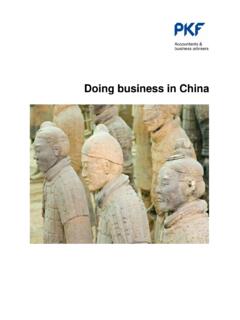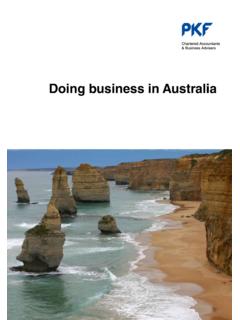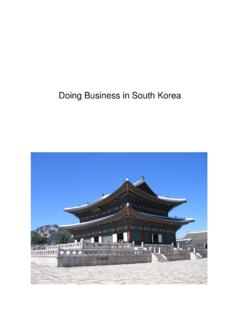Transcription of Doing business in Austria - PKF International
1 Accountants &. business advisers Doing business in Austria important disclaimer No person should act or rely upon any matter on information contained in or implied in this publication without first obtaining advice from a qualified adviser that relates specifically to their particular circumstances. This publication should not be regarded as offering a complete explanation of the taxation matters referred to. The publishers and the authors are not responsible for the results either of any actions taken on the basis of information in this publication, nor for any error in or omission from this publication. The publishers and the authors expressly disclaim all and any liability and responsibility to any person, who acts or fails to act as a consequence of reliance upon the whole or any part of the contents of this publication. preface PKF Austria comprises four firms that trade as PKF with offices in Vienna and Salzburg including one firm specializing in hotel consulting.
2 The PKF Austria Member Firms are also legally independent members of PKF International Limited, which has around 240 legally independent firms in 438 locations in around 125 countries. The thousands of clients of the Austrian firms range from multi-national conglomerates to business startups and private individuals. We all commit to provide our clients with a consistent quality of service, which means that no matter how small your business or individual needs might be, your affairs are personally overseen by a partner. In practice, this means that your partner will ensure that you are provided with the right skills to help you operate more profitably and tax effectively. You will be given a commitment to provide you with timely, expert advice. As a result of understanding your needs, your partner will be able to take the initiative and offer pro-active advice.
3 PKF sterreicher-Staribacher Wirtschaftspr fungs GmbH & Co KG is a member firm of the PKF International Limited network of legally independent firms and does not accept any responsibility or liability for the actions or inactions on the part of any other individual member firm or firms. Contents Introduction 1. Geography 1. Advantages of Investing in Austria 1. Constitution 2. Communications 2. Language and Currency 2. Legal System 3. Major Exports and Imports 3. Government Policy on Foreign Investment in Austria 3. Import Controls 4. Exchange Controls 5. Source of Finance 5. business Structures 6. Types of business Structures 6. Companies 6. - Governing Documents 7. - Directors 7. - Forming a company 7. - Registration requirements and filing procedures for public securities 8. - Audit requirements and practices 9. - Shareholdings by non-residents 10.
4 Foreign companies 10. Partnerships 10. Joint Ventures 11. Foundations 11. PKF - Doing business in Austria - Contents I. Taxation 12. Introduction 12. Income Taxation Law and Administration 12. Fiscal Year 12. Taxpayers 13. Taxable Income 13. - Lodgement of Returns 16. - Payment of Tax 16. - Residence and source 17. Taxation of Partnerships 17. Taxation of Companies 18. - Taxation of Profits 18. - Taxation of groups of companies 18. - Dividend Withholding Tax 19. - Taxation of Branches 20. Interest deductions 20. Repatriation of Profits and Transfer Pricing 20. Taxation of Capital Gains 21. Interaction with International Tax Regime 22. Taxation of Individuals 23. - Residents 23. - Non-Residents 23. - Individual income tax rates 24. - Social Security System 24. Other Taxes 25. - Value Added Tax (VAT) 25. - Stamp duties 27. - Inheritance and Gift Tax 27.
5 - Real estate transfer tax 28. - Pay-roll taxes 28. - Miscellaneous taxes 28. - Customs duties 29. II PKF - Doing business in Austria - Contents Grants and Incentives 30. General Introduction 30. Government Investment Incentives 30. - Federal, regional and EU funding instruments 30. - Tax Incentives 31. - Export Finance and Insurance 32. Protection of Intellectual and Industrial Property 34. Copyright 34. Trade Marks 34. Trade Names 34. Patents 35. Immigration 36. Migration to Austria 36. Permanent Residence 36. Temporary Residence 37. Visitors 38. Work Permits 38. Visa - for short stay 39. Residence permit 39. Conditions for a residence permit 40. PKF - Doing business in Austria - Contents III. Introduction Geography The federal republic of Austria is located in Central Europe. It is a predominantly mountainous country with an area of km2 and a population of approx.
6 8,5 million. Eight countries namely Italy, Switzerland, the Principality of Liechtenstein, Germany, the Czech Republic, Slovakia, Hungary and Slovenia form the Austrian border. Austria joined the European Union (EU) in 1995, which comprises 27. European member states as of 2008. Advantages of Investing in Austria Austria 's main advantages are its economic, political and labour stability, its highly skilled workforce, a high standard of living, internal security and its well-established business ties to Central and Eastern Europe as well as far-reaching integration in the world economy. As a member of the EU, Austria is also a member of the Euro zone. Austria is a member of the United Nations, a party to the WTO, member of the OECD, the World Bank, the International Finance Corporation and the International Development Association. Austria is one of the safest countries in the world.
7 This goes for politics as well as for the business climate, a low crime rate and the legal system a framework companies can rely on. Due to its rich historic background, the beautiful scenery and a dynamic and innovative economy it is valued as a cultural nation, a holiday destination and a business partner. The diverse leisure possibilities in a secure environment make International managers feel at home here. PKF - Doing business in Austria - Introduction 1. Apart from that, Austria is an attractive location from a tax perspective as it provides a competitive corporate income tax rate of 25% with an effective rate that is competitive due to several tax reliefs even in comparison to other countries with lower nominal rates. Additional benefits come from several tax incentives, most notably for R&D- expenditure, education expenditure and incentives for groups of companies and the lack of wealth, inheritance and trade taxes.
8 Not only International companies but also smaller foreign firms with subsidiaries can reap enormous advantages from the group taxation provisions in relocating operations to Austria , especially in establishing headquarters for the Eastern European region. Constitution Austria is a democratic republic established as a federal state. The parliament consists of two chambers: the National Council, which is elected directly by the people and the Federal Council, which represents Austria 's nine federal provinces. Communications Internal and external communications as well as transportation systems are excellent. The telephonic direct dialling system allows instantaneous International communication from both fixed and mobile units. Access to the internet is easily available from almost everywhere in the country both on a cabled and/or wireless basis.
9 Language and Currency The main language spoken in Austria is German. The common currency is the Euro ( ) with 1 = 100 Cent. 2 PKF - Doing business in Austria - Introduction Legal System The legal system is structured according to a so-called tier system of laws, which decrees that laws and regulations must comply with the standards set by the higher tiers (eg. the constitution, constitutional laws). At the top tier are the Austrian Federal Constitution and individual constitutional laws, as well as the EU Acts of Accession. General federal laws and laws of the federal provinces are in the lower tiers. There is no Case Law system in Austria . This means that the judges are free to reach their own decisions or rulings, although previous rulings may be adduced in hearings. Austria adopted the EU legal framework as of January 1, 1995 on entry to the EU.
10 Major Exports and Imports Most export earnings are derived from machinery and equipment, metal goods, chemicals, mineral fuels and oils, vehicles, electric and electronic equipment, paper products, textiles, food and agricultural raw materials. Major imports are machinery and equipment, motor vehicles, chemicals, metal goods, oil and oil products and food. Government Policy on Foreign Investment in Austria The Government recognises that foreign investment makes a substantial contribution to the development of Austria 's industries and resources, and its policy is to welcome and encourage long-term direct foreign investment that has beneficial economic effects. PKF - Doing business in Austria - Introduction 3. Austria 's law follows the regulations and the directives of the EU. The basic notion of the EU guidelines is that people, capital investments and goods originating from a member country can circulate freely within the EU.




